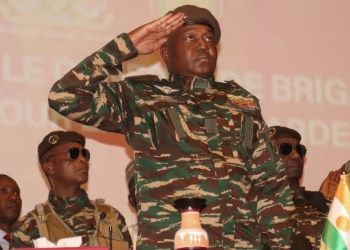Several nations have advised their citizens to depart Lebanon, with the US urging its nationals to leave using any available means, amid escalating concerns of broader conflict in the Middle East.
Iran has vowed to retaliate severely against Israel, blaming it for the assassination of Hamas political leader Ismail Haniyeh in Tehran on Wednesday. Israel has not responded to these allegations.
Haniyeh’s killing occurred shortly after Israel targeted and killed Hezbollah senior commander Fuad Shukr in Beirut.
Western officials are concerned that Hezbollah, an Iran-backed militia and political group in Lebanon, could play a significant role in potential retaliatory actions, prompting serious responses from Israel.
Efforts by the US and other Western nations continue diplomatically to de-escalate tensions across the region.
In response to these developments, the US, UK, Sweden, France, Italy, Canada, and Jordan have advised their citizens to leave Lebanon as soon as possible, as flights from Beirut’s sole commercial airport are increasingly disrupted or canceled.
While flight prices have surged, there has been no observable panic or rush among people to leave.
Fears of escalating hostilities engulfing Lebanon are at their peak since Hezbollah’s attacks on Israel, following deadly Hamas assaults on southern Israel on October 7 in support of Palestinians in Gaza.
Most of the violence has been contained to border regions, with indications from both sides of their reluctance to escalate into broader conflict.
Despite this, Hezbollah has pledged retaliation for Shukr’s assassination in Dahiyeh, its stronghold in Beirut’s southern suburbs.
On Sunday, Hezbollah launched numerous rockets towards Beit Hillel in northern Israel around 00:25 local time (21:25 GMT Saturday).
Videos shared on social media depicted Israel’s Iron Dome intercepting these rockets, with no reported casualties.
In response, the Israeli Air Force struck targets in southern Lebanon.
Separately, two fatalities were reported in a stabbing incident in Holon, Israel, on Sunday morning, with the attacker subsequently neutralized, according to police.
In a statement on Saturday, the US Embassy in Beirut advised those choosing to remain in Lebanon to prepare contingency plans and be ready for potential prolonged periods of sheltering in place.
The Pentagon has announced the deployment of additional warships and fighter jets to the region to aid in defending Israel against possible attacks by Iran and its allies, a strategy akin to actions taken in April when Iran launched over 300 missiles and drones at Israel in retaliation for an attack on its diplomatic compound in Syria, which it blamed on Israel.
There are concerns that Iran’s response this time could follow a similar pattern.
The UK has confirmed plans to dispatch additional military personnel, consular staff, and border force officials to assist with any evacuations.
It has advised British citizens to leave Lebanon while commercial flights are still operating.
Two British military vessels are already stationed in the region, with the Royal Air Force preparing transport helicopters for potential deployment.
UK Foreign Secretary David Lammy has cautioned that the regional situation could deteriorate rapidly.
In a Friday phone call with EU Foreign Policy Chief Josep Borrell, Iran’s Acting Foreign Minister Ali Baqeri Kani affirmed Iran’s intention to exercise its inherent and lawful right to “punish” Israel.
Iran’s state television warned on Friday of “extraordinary scenes” that the world could witness.
Israeli Prime Minister Benjamin Netanyahu has warned Israelis of challenging times ahead, stating that threats have been received from all sides and that Israel is prepared for any scenario.
Tensions between Israel and Iran escalated initially with the deaths of 12 children and teenagers in an attack on the Israeli-occupied Golan Heights.
Israel accused Hezbollah and vowed severe retaliation, though Hezbollah denied involvement.
Shortly thereafter, Shukr, a close advisor to Hezbollah leader Hassan Nasrallah, was killed in a targeted Israeli airstrike in Beirut, resulting in the deaths of four others, including two children.
Hours later, Hamas leader Ismail Haniyeh was assassinated in Iran, Hamas’s primary supporter. He had been visiting to attend the inauguration of Iran’s new president, Masoud Pezeshkian.
Iran’s Supreme Leader Ayatollah Ali Khamenei has declared that Israel will face a harsh punishment for Haniyeh’s killing.
Haniyeh’s assassination dealt a blow to negotiations for a ceasefire and the release of hostages in Gaza, which were seen as crucial steps to ease tensions along the Lebanon-Israel border.















